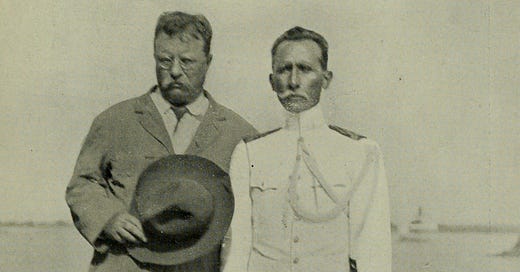"Ascending the Sepotuba River" by Theodore Roosevelt, 1914
"The fireplace was a platform of earth, taken from anthills, and heaped and spread on the boards of the boat. Around it the dusky cook worked with philosophic solemnity in rain and shine."
In 1914, Theodore Roosevelt, his son Kermit, Brazilian adventurer Colonel Cândido Rondon, and others travel through remote and wild Brazil, initially in relative comfort, before reaching the unexplored and deadly River of Doubt.
On the 13th we broke camp, loaded ourselves and all our belongings on the launch and the house-boat, and started upstream for Tapirapoan. All told there were about thirty men, with five dogs and tents, bedding and provisions; fresh beef, growing rapidly less fresh; skins—all and everything jammed together.
It rained most of the first day and part of the first night. After that the weather was generally overcast and pleasant for travelling; but sometimes rain and torrid sunshine alternated. The cooking—and it was good cooking—was done at a funny little open-air fireplace, with two or three cooking-pots placed at the stern of the house-boat.
The fireplace was a platform of earth, taken from anthills, and heaped and spread on the boards of the boat. Around it the dusky cook worked with philosophic solemnity in rain and shine. Our attendants, friendly souls with skins of every shade and hue, slept most of the time, curled up among boxes, bundles, and slabs of beef. An enormous land turtle was tethered toward the bow of the house-boat. When the men slept too near it, it made futile efforts to scramble over them; and in return now and then one of them gravely used it for a seat.
Slowly the throbbing engine drove the launch and its unwieldy side-partner against the swift current. The river had risen. We made about a mile and a half an hour. Ahead of us the brown water street stretched in curves between endless walls of dense tropical forest. It was like passing through a gigantic greenhouse. Wawasa and burity palms, cecropias, huge figs, feathery bamboos, strange yellow-stemmed trees, low trees with enormous leaves, tall trees with foliage as delicate as lace, trees with buttressed trunks, trees with boles rising smooth and straight to lofty heights, all woven together by a tangle of vines, crowded down to the edge of the river. Their drooping branches hung down to the water, forming a screen through which it was impossible to see the bank, and exceedingly difficult to penetrate to the bank. Rarely one of them showed flowers—large white blossoms, or small red or yellow blossoms. More often the lilac flowers of the begonia-vine made large patches of color. Innumerable epiphytes covered the limbs, and even grew on the roughened trunks. We saw little bird life—a darter now and then, and kingfishers flitting from perch to perch.
At long intervals we passed a ranch. At one the large, red-tiled, whitewashed house stood on a grassy slope behind mango trees. The wooden shutters were thrown back from the unglazed windows, and the big rooms were utterly bare—not a book, not an ornament. A palm, loaded with scores of the pendulous nests of the troupials, stood near the door. Behind were orange-trees and coffee-plants, and nearby fields of bananas, rice, and tobacco. The sallow foreman was courteous and hospitable. His dark-skinned women-folk kept in the furtive background. Like most of the ranches, it was owned by a company with headquarters at Caceres.
The trip was pleasant and interesting, although there was not much to do on the boat. It was too crowded to move around save with a definite purpose. We enjoyed the scenery; we talked—in English, Portuguese, bad French, and broken German. Some of us wrote. Fiala made sketches of improved tents, hammocks, and other field equipment, suggested by what he had already seen. Some of us read books. Colonel Rondon, neat, trim, alert, and soldierly, studied a standard work on applied geographical astronomy. Father Zahm read a novel by Fogazzaro. Kermit read Camoens and a couple of Brazilian novels, O Guarani and Innocencia. My own reading varied from Quentin Durward and Gibbon to the Chanson de Roland. Miller took out his little pet owl Moses, from the basket in which Moses dwelt, and gave him food and water. Moses crooned and chuckled gratefully when he was stroked and tickled.
Late the first evening we moored to the bank by a little fazenda of the poorer type. The houses were of palm leaves. Even the walls were made of the huge fronds or leafy branches of the wawasa palm, stuck upright in the ground and the blades plaited together. Some of us went ashore. Some stayed on the boats. There were no mosquitoes, the weather was not oppressively hot, and we slept well. By five o’clock next morning we had each drunk a cup of delicious Brazilian coffee, and the boats were under way.
From Through the Brazilian Wilderness by Theodore Roosevelt, 1914, available on Amazon*
Classic Travel Tales on Facebook
*As an Amazon Associate we earn a bit from qualifying Amazon purchases.
Image: “Colonel Theodore Roosevelt with Colonel Rondon,” photo by Kermit Roosevelt, “Portraits—Eminent Men and the Museum,” The American Museum Journal, Vol. XIV, No. 5, 1914, public domain.



